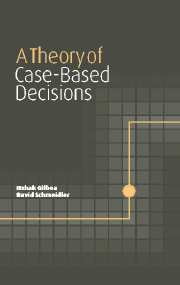4 - Conceptual foundations
Published online by Cambridge University Press: 22 September 2009
Summary
This chapter deals with the conceptual and epistemological foundations of case-based decision theory. The discussion is most concrete when CBDT is juxtaposed with the two other formal theories of reasoning. We begin with a comparison of CBDT with EUT. We then proceed to compare CBDT with rule-based systems. We argue that, on epistemological grounds, CBDT is more naturally derived than the two other approaches.
CBDT and expected utility theory
We devote this section to several remarks on the comparison between CBDT and EUT, and to our views concerning their possible applications and philosophical foundations. For the purposes of this discussion we focus on the most naive and simplest version of CBDT, namely, U-maximization.
Reduction of theories
While CBDT is probably a more natural framework in which one may model satisficing behavior, EUT can be used to explain this behavior as well. For instance, assume that we observe a decision maker who never uses certain acts available to her. By ascribing to her appropriately chosen prior beliefs, we may describe this decision maker as an expected utility maximizer. In fact, it is probably possible to provide an EUT account of any application in which CBDT can be used, by using a rich enough state space and an elaborate enough prior on it. Conversely, one may also simulate an expected utility maximizer by a U-maximizer whose memory contains a sufficiently rich set of hypothetical cases.
Information
- Type
- Chapter
- Information
- A Theory of Case-Based Decisions , pp. 91 - 108Publisher: Cambridge University PressPrint publication year: 2001
